As predicted since the 19th century, the planet is undergoing a dramatic rise in global temperature. The last 10 years have been the hottest ever recorded in history. However, the term “global warming,” commonly used until the 1990s to describe the role of greenhouse gases in increasing the Earth’s surface temperature, has largely disappeared from everyday language. At the turn of the millennium, it was skillfully replaced by the euphemism “climate change,” driven by the administration of George W. Bush. The president could not afford to blame the private sector—especially the lucrative oil and gas industry, to which he owed both his electoral victory and shareholder profits—for being responsible for the planet’s destruction.
Once the idea that Earth was progressively heating due to the extensive and intensive use of fossil fuels for industrial and transportation energy was set aside, the door was opened to even deny that this was possible. Consequently, many powerful politicians have gone beyond simply refuting that human activity is altering climate patterns. They have gone so far as to demonize potentially effective and viable solutions, such as solar and wind energy. As a result, the goal of the Paris Agreement—to limit global warming to below two degrees Celsius above pre-industrial levels—is becoming increasingly unattainable.
“Climate change” is an ambiguous concept that says everything and says nothing. This vagueness allows for grand-sounding initiatives such as the Intergovernmental Panel on Climate Change (IPCC). A more accurate name for this panel could be: “Periodic Compilation of Data on Planetary Destruction Due to Human Activity”, though even that title likely would not alarm us. Both the word “change” and our understanding of what is truly happening carry the implication that our self-annihilation as a species is inevitable, like a traffic light turning from green to red, or the natural progression from old age to death.
The climate change that some, with the power to reverse it, deny, is accepted by others as a given, for which there are solutions like “adaptation” and “resilience.” Faced with this dichotomy, it becomes impossible to envision a different future—one with less consumption of fossil fuels and polluting products like plastic and single-use clothing. Much less, a future with greater social justice and less poverty and marginalization. We are left seeking partial exits instead of root-cause solutions.
How did we get here? Through a well-funded and coordinated discourse, similar to, but exponentially larger than, that of the tobacco industry, which once sold the fantasy that there was no scientific evidence linking smoking to cancer, and claimed that banning smoking in public spaces violated personal freedoms.
This approach to the problem has serious real-world consequences. For example, Republican Governor Ron DeSantis of Florida recently signed a law prohibiting municipalities from enacting heat protection measures for workers. Just like tobacco, heat exposure impacts health, and blocking policies that mitigate its effects is equivalent to denying the dangers of climate extremes. The scale of the issue is stark. In the U.S. alone, according to Public Citizen, around 2,000 workers die annually from heat stress, and thousands more suffer from heat-related illnesses such as heatstroke and dehydration.
Heat affects us from the womb to the grave. Humans who develop less during gestation due to extreme heat—and who are even born prematurely for the same reason—suffer lasting consequences on their lives. Meanwhile, health systems bear the economic burden of a growing number of people affected by these conditions.
Global warming, a term that once referred to the transformation of the planet rather than just its climate, should logically have led us to speak of the genuine climate crisis we are living through. We can no longer say the Earth is warming—it is already hot. Nor can we speak of climate “change” anymore, but rather of a climate emergency that cannot be ignored. The planet is at the doorstep of the emergency room, simultaneously drying up and flooding, battered by intense storms and paralyzed by stifling heat.
International agreements are proving insufficient, especially when the ongoing wars in Europe, the Middle East, and Africa show that human lives are, in practice, disposable. We know that the best way to stop the rise in global temperature is to reduce carbon dioxide accumulation, but the deniers and governments with the power to lead others toward change are unwilling to make the necessary efforts.
It is as if the leaders in charge of guiding us were instead stoking the flames of a wildfire in a dry forest.
This text is part of a collaboration between the Organization of Ibero-American States for Education, Science and Culture (OEI) and Latin America 21 for the dissemination of the platform Voices of Ibero-American Women. Learn more and join the platform here.
*Machine translation proofread by Janaína da Silva













